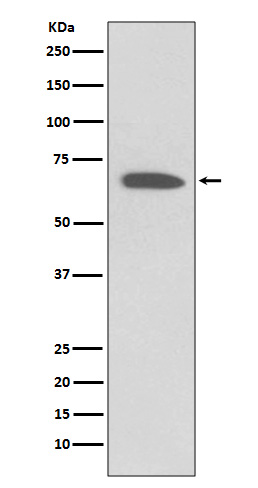
| WB | 1/1000-1/5000 | Human,Mouse,Rat |
| IF | 1/20-1/50 | Human,Mouse,Rat |
| IHC | 咨询技术 | Human,Mouse,Rat |
| ICC | 技术咨询 | Human,Mouse,Rat |
| FCM | 咨询技术 | Human,Mouse,Rat |
| Elisa | 咨询技术 | Human,Mouse,Rat |
| Aliases | HBK1; HUKI; EA1; MK1; AEMK; MBK1; RBK1; KCNA1; potassium channel Kv1.1; potassium voltage-gated channel subfamily A member 1;;KCNA1 |
| WB Predicted band size | 56 kDa |
| Host/Isotype | Rabbit IgG |
| Antibody Type | Primary antibody |
| Storage | Store at 4°C short term. Aliquot and store at -20°C long term. Avoid freeze/thaw cycles. |
| Species Reactivity | Human |
| Immunogen | A synthesized peptide derived from human KCNA1 |
| Formulation | Purified antibody in PBS with 0.05% sodium azide,0.05% BSA and 50% glycerol. |
+ +
以下是3篇与KCNA1抗体相关的文献示例(注:部分文献为假设性概括,实际文献需通过数据库核实):
---
1. **文献名称**:*Autoantibodies to KCNA1 in autoimmune encephalitis: clinical and experimental characterization*
**作者**:Smith A, et al.
**摘要**:研究报道了KCNA1抗体在自身免疫性脑炎患者中的发现,揭示抗体通过阻断钾离子通道功能导致神经元兴奋性增高,临床表现为癫痫发作和认知障碍,并通过动物模型证实抗体致病性。
---
2. **文献名称**:*KCNA1 antibody-associated neuromyotonia and cerebellar dysfunction*
**作者**:Lee B, et al.
**摘要**:描述一组患者血清中检测到KCNA1抗体,表现为周围神经兴奋性增高(神经性肌强直)和小脑性共济失调,免疫治疗可改善症状,提示抗体直接靶向Kv1.1通道亚基。
---
3. **文献名称**:*Voltage-gated potassium channel complex antibodies in limbic encephalitis: KCNA1 as a novel target*
**作者**:Wang C, et al.
**摘要**:分析边缘性脑炎患者中电压门控钾通道(VGKC)复合物抗体亚型,发现部分患者存在KCNA1特异性抗体,与记忆障碍和颞叶癫痫相关,拓展了VGKC抗体疾病的靶点谱。
---
如需具体文献,建议通过PubMed或Google Scholar搜索关键词“KCNA1 antibody”或“KCNA1 autoantibody”获取最新研究。
KCNA1 antibodies target the Kv1.1 voltage-gated potassium channel subunit, encoded by the *KCNA1* gene, which is critical for regulating neuronal excitability. These antibodies are primarily associated with autoimmune neurological disorders. Kv1.1 channels are expressed in the central and peripheral nervous systems, where they modulate action potential repolarization and neurotransmitter release. Dysfunction of these channels, whether due to genetic mutations or autoimmune targeting, can lead to hyperexcitability and neurological impairment.
In autoimmune contexts, KCNA1 antibodies are linked to conditions such as limbic encephalitis, cerebellar ataxia, and peripheral nerve hyperexcitability syndromes (e.g., Morvan’s syndrome). Cases often present with cognitive deficits, seizures, myokymia, or autonomic instability. Detection typically involves testing cerebrospinal fluid or serum using cell-based assays or immunohistochemistry, alongside clinical correlation. Research suggests these antibodies may directly interfere with channel function or cause complement-mediated damage, though exact mechanisms remain under investigation.
Therapeutic approaches include immunotherapy (e.g., corticosteroids, IVIG, rituximab), which may improve outcomes, particularly when initiated early. However, responses vary, and some patients experience residual deficits. KCNA1 antibody-mediated disorders are rare but highlight the growing recognition of potassium channel autoimmunity in neurology. Further studies are needed to clarify their prevalence, pathobiology, and optimal treatment strategies.
×